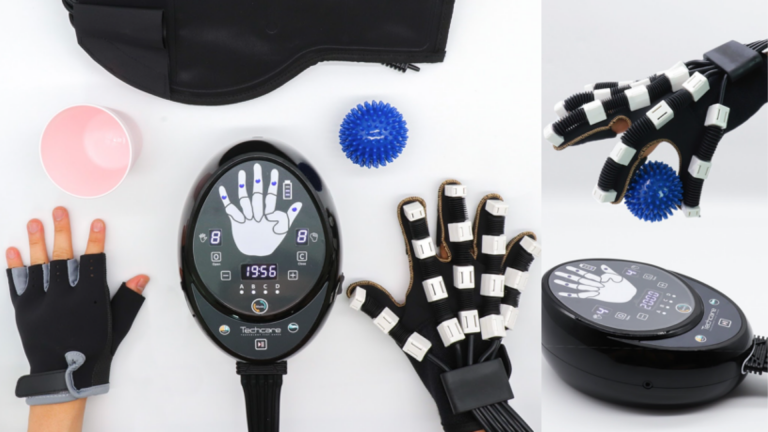Techcare Innovation Empowering Stroke Recovery with I4.0 Robotic Technology

by admin

The Petri Dish – 7 September 2021
BY DR MAHALETCHUMY ARUJANAN & SAARANI VENGADESEN
STROKE is the leading cause of disability worldwide with 14.5 million stroke cases every year (WHO). A STROKE causes damage to our brain cells and robs us of mobility that we take for granted. Bending our fingers is effortless but not for a stroke patient who requires so much determination and motor coordination.
Asking a stroke patient to practice bending his or her fingers 10 times per rehabilitation session is already an arduous task – but what they need to do to recover from their disability is to flex their fingers for 400-600 times daily.
The almost impossible task is now made possible with the aid of robotics and Industry 4.0 (I4.0). The robotics is developed by a Malaysian robotics engineer, Dr Khor Kang Xiang who is Chief Executive Officer of Techcare Innovation Sdn Bhd.
Techcare Innovation is a robotic company to provide technology to empower human recovery. The name Techcare denotes “Technology that Cares” with a mission to create technological innovation for people in need of rehabilitation and help them restore their body functions as soon as possible. This innovation greatly supports stroke patients and those recovering from surgery, sports injuries, accidental injuries and other people in need of rehabilitation.
Speaking to The Petri Dish, Khor says I was involved in robotics since my undergraduate days.
Khor joined the Robocon club during his undergraduate days in Universiti Teknologi Malaysia. Together with other team member they manage to win the “Best Design Award” in Egypt, representing Malaysia.
“This was my passion as an engineer. It led me to win many international awards and at one point I was so preoccupied to win awards. However, being 3rd place at one of the competition in Indonesia was a wake-up call for me. It was then I realised it was not about winning a competition but turning my skills to benefit society,” says Khor.
To employ his knowledge and skill to serve society came like a flash in the pan for Khor after he visited a stroke centre. Seeing the physical struggles of stroke patients to do very basic things like buttoning up their shirts – made him realise the pressing need for technology-aided rehabilitation.
Khor began his new mission to serve the stroke-disabled by visiting over 20 rehabilitation centres in hospitals. He spoke to patients at length spending enough time to know their needs and what they felt. Khor also spent time talking to therapists and physio experts to understand the limitations they were facing.
He found the key challenges for the therapists and stroke patients is that rehabilitation process requires a lot of efforts, time and consistent training to see motor improvement.
Robotics equipment is proven to be able to increase the training frequency and fasten the motor recovery, however most are still using the basic rehabilitation equipment as advance robotic devices are costly and mostly only available in big hospital. Besides, traveling to rehabilitation session is a big hurdle for patients and caregivers, with an average of additional 1-2 hours travelling time spend for each session.
“Now imagine if a patient needs to spend 1 to 2 hours of travelling and to perform 400-600 of training repetition every day to get a good neuroplasticity recovery, it will be a very tiring and time-consuming process. This is where robotic-assisted rehabilitation becomes a life-changing special aid to patients, where robot able to provide 1000 of repetition in 1 hour even at the comfort of their home.” says Khor.
With limited resources and facility, together with his friend they start to create prototype to build the robot in their hostel.
Fortunately, they manage to win RM50,000 at MyInovasi Innovation competition to continue improving the project.
Techcare’s core innovations
Khor’s innovation involves artificial intelligence, machine learning, and robots for various functional training, including driving simulation and wearable robots. With the help of I4.0, Khor developed gadgets that are able to provide precision rehabilitation by recording the data points that help therapists to design improvements to the workouts. The software in the gadgets also support customisation for each patient as every stroke patient has different requirement and physical challenges while doing their workouts – also based on their neurological ability.
Currently, Techcare’s core innovation is CR2-haptic which is a compact and portable rehabilitation robot. This device can be used to improve or maintain the fitness of the patients’ wrist and forearm. The device is designed in a way that enables the patient to train while playing games. And this motivates them to train frequently and without losing interest. This is important as stroke patients lose interest quickly and get bored at the things they need to do repetitively. “The device also records the analytical data on how much the patient is improving”, adds Khor.
Hand Robot (HR-30) is a finger robotic device using air pressure technology to assist the natural hand movement of patient and increase hand training frequency with 1000+ repetition in 60mins. It is very easy to use, it takes less than 3mins to start. Just wear the glove, turn on the robot, and then click start. With this portable hand robot patient can do training without waiting for the session and having to face the drudgery of what they have to do. In this way, they are able to accomplish more time in practising each modality to gain physical mobility and general improvement quickly.
Another fascinating product is FIBOD Smart Balance which allows users to train their balancing skills using virtual reality games and objective assessment programmes. This device is not limited to stroke patients as the sense of balance tends to deteriorate with ageing.
“We want all our devices to be easily accessible to patients because previously these facilities are only available in hospitals and patients have to take turns to use the device. Now we are making these gadgets accessible and affordable where patients can use it in their home setting”, says Khor.
Tele-Rehab platform is another feature where patients are trained through the internet which gives a sense of independence to them. This also allows therapists to monitor more than one patient at a time.
“Tele-Rehab platform helps a lot in reforming the mindset of stroke patients. Initially, they think that exercise done in the centre is sufficient. For instance, they go to rehab centres three times a week and do less exercise at home which does not support quick recovery. Tele-Rehab Technology saves time, cost and gives a faster result,” Khor explains.
MTDC and Techcare
Developing healthcare devices is always a challenging journey which requires numerous attempts, long R&D period, and large funding. Medical devices require clinical validation before commercialisation and the cost of the clinical trial is very costly. This is resolved with Techcare applying for National Technology Innovation Sandbox (NTIS) funding to support some of their innovation product.
“We applied for National Technology Innovation Sandbox (NTIS) and was fortunate that Malaysian Technology Development Corporation (MTDC) approved the funding for us to obtain the certification and conduct validation studies as the regulations are stringent for healthcare- related products which required huge funding”, said Khor.
Khor explained that currently they are doing validation in hospitals for some of their innovation, working closely with health professionals at Hospital Kuala Lumpur and Clinical Research Center at Hospital Tunku Azizah to benchmark with the international golden standards.
The Personal Connection
“Last year when my dad had a stroke and seeing his struggle to regain mobility changed my perspective of these robots completely. I realised all these years I was more focused on the gadgets and the engineering and not the psychology and aspirations of the patient. Today, I add the human factor to my innovation,” says Khor.
“When I was assisting my father I realised that technology needs to be more comprehensive and practical because it is not just the hands that needs training but the whole body”, empathises Khor.
The experience with his father was a game-changer. He is now moving away from just gamifying his gadgets where patients play games while exercising.
“The rehab has to be more practical and help the patients quickly rather than playing fancy games. Creating a humanised technology is an element that Techcare is looking forward to,” he says.
Techcare is also positioning itself in the global market with clients from India, China, Thailand and UK. Khor also foresees a potential partnership with therapists to provide them with the knowledge of using their gadgets. Apart from being a business entity, Techcare has a bigger vision to build the ecosystem to support more stroke patients with clinical, technology and educational support.
The Mentor and Support
Khor attributes his success to his undergraduate supervisor for guiding him through the journey, Dr Yeong Che Fai who is currently the CEO of DF Automation & Robotics which is another start-up under the MTDC ecosystem and a recipient of Business Start- up Fund (BSF) and NTIS fund as well.
“I remember Dr Yeong staying with us in our hostel room till 5am to advise us just before our competition. Even he was not feeling well but he gave his fullest support,” recalls Khor.
With all the support from Dr Yeong, his undergraduate final year project also won the prestigious World Invention Awards in the British Invention Shows, which is the largest international invention exhibition in United Kingdom.
With Yeong’s support and guidance, together with Dr Yeong and other friend they founded Techcare and continued to innovate and after winning about 30 awards. Later, Khor also completed his PhD in Rehabilitation Engineering with scholarship support from CREST.
Even he faced many challenges and failures in the journey, Dr Khor still continue his passion in stroke rehabilitation technology innovation, as he hopes the technology can better serve stroke survivor in their recovery journey.
“It is tough, but I think as an engineer it is my honour to serve the community with our education and skills” said Khor.
He also credited the success to all the people who supported the journey, especially to Malaysian Technology Development Corporation (MTDC), Universiti Teknologi Malaysia (UTM), National Stroke Association of Malaysia (NASAM), Collaborative Research in Engineering Science and Technology (CREST), Malaysian Global Innovation and Creativity Centre Malaysia, Proficeo Consultant Sdn. Bhd., Cradle Coach and Grows Program, Clinical Research Center Malaysia (CRC), Clinical Research Malaysia (CRM), Hospital Kuala Lumpur, Hospital Tunku Azizah, Hospital Rehabilitasi Cheras, DF Automation & Robotics Sdn. Bhd., YK Natural Physio and Academy and many others.





